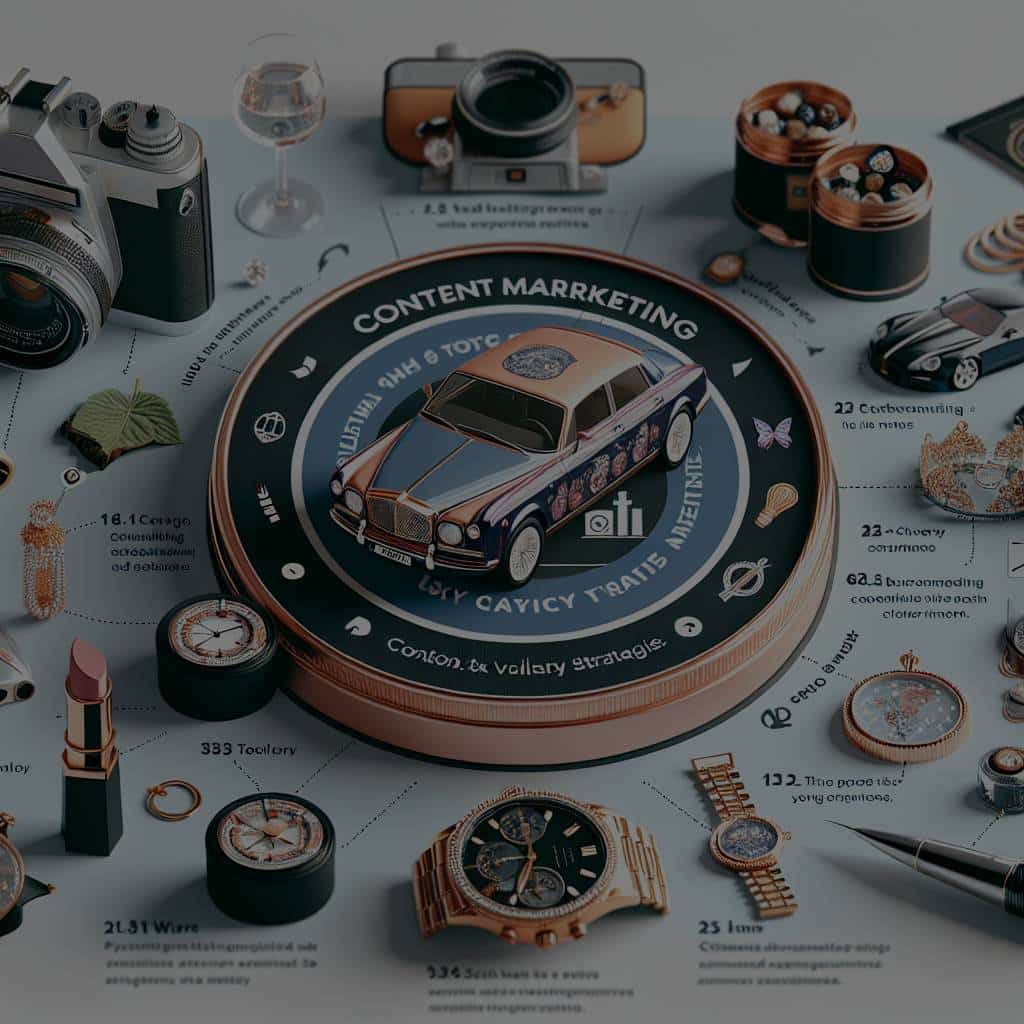What Are the Best Content Marketing Strategies for UK Luxury Brands?

In the era of digital media, luxury brands can no longer rely solely on the traditional modes of marketing. The landscape is changing, and these prestigious brands must adapt to retain their market position. This article will explore the content marketing strategies that luxury brands can utilize to engage their customers and maintain their esteemed status.
The Influence of Digital Marketing on Luxury Brands
Digital marketing has become the new norm, and it substantially influences how luxury brands interact with their audience. As a brand, your digital presence not only directs how you interact with your customers but also how your brand is perceived.
In parallel : How Can UK Companies Integrate Circular Economy Principles in Their Operations?
The old-fashioned perception of luxury was exclusivity, but in the digital era, brands need to balance exclusivity with accessibility. If you are too exclusive, you risk alienating your audience. But if you are too accessible, you may dilute your brand’s luxurious appeal.
Digital marketing offers a platform for luxury brands to showcase their products in a more interactive way. Brands can use high-quality images, video content, and engaging captions to portray their products’ opulence.
Also to discover : What Are the Implications of the UK Plastic Tax for the Packaging Industry?
How SEO Can Enhance Online Visibility for Luxury Brands
Search Engine Optimization (SEO) is a fundamental aspect of any online marketing strategy. For luxury brands, robust SEO strategies can enhance their online visibility, drive more traffic to their website, and ultimately generate more sales.
By using SEO, you will ensure that when people search for products similar to what your brand offers, your website will appear among the top results. You can achieve this by incorporating relevant keywords into your website content, blog posts, product descriptions, and meta descriptions.
Keep in mind that SEO is not a one-time effort. It requires continuous optimization, monitoring, and tweaks based on data analytics. Therefore, investing in an agency that offers SEO services could prove beneficial for luxury brands.
Use of Social Media in Luxury Brands Marketing
Social media platforms are the perfect vehicle for luxury brands to showcase their products. With visually driven platforms like Instagram and Pinterest, luxury brands can effectively communicate their brand story and the uniqueness of their products.
The key to effective social media marketing is understanding your audience. If you know who your customers are and what they want, you can create content that resonates with them. This could be a behind-the-scenes video of your latest product creation, a post about the history of your brand, or images showcasing your products.
Remember that social media is not just about posting content. It’s about engaging with your audience. Respond to comments, like posts, and show your customers that you value their input. This will help foster a sense of community around your brand.
Content Marketing: A Brand Storytelling Strategy
Storytelling has always been a powerful tool for connecting with people. For luxury brands, storytelling can be an effective content marketing strategy. By sharing your brand’s story, you can create a deeper connection with your customers.
A brand story is not just about your products. It’s about your brand’s history, your values, your mission, and what sets you apart from other brands. This content can be shared through various mediums, such as your website, blog posts, social media posts, and video content.
When crafting your brand story, authenticity is key. Today’s customers value transparency and integrity. So, be honest, be authentic, and let your customers see the real you.
The Role of Influencer Marketing in Promoting Luxury Brands
Influencer marketing has become a staple in many brands’ marketing strategies, and luxury brands are no exception. Collaborating with influencers can help luxury brands reach a broader audience and increase their brand visibility.
Choose influencers who align with your brand’s values and aesthetic. This will ensure that the collaboration feels natural and authentic to your audience. Also, consider the influencer’s audience demographics to ensure they align with your target customers.
Influencer marketing should not be a one-off campaign. Instead, aim for long-term partnerships where the influencer can gradually introduce their audience to your brand. This approach will yield more significant results and solidify your brand’s position in the luxury market.
In this digital age, content marketing is a powerful tool for luxury brands. By leveraging SEO, social media, storytelling, and influencer marketing, brands can create a dynamic online presence that resonates with their audience. This will not only enhance brand visibility but also foster a deeper connection with customers. Remember that effective content marketing is about creating high-quality, engaging, and authentic content. It’s about conveying your brand’s story and values, showcasing your products, and engaging with your audience.
The Power of Email Marketing for Luxury Brands
A direct and personal way of connecting with consumers, email marketing is a potent tool in the arsenal of luxury brands. Although it might seem a bit traditional compared to flashier social media platforms, email marketing offers unique benefits that can help luxury brands engage their target audience effectively.
Email marketing allows brands to tailor content to individual consumers based on their preferences and behaviours. For instance, if a customer has been browsing bags on a luxury brand’s website, an email showcasing their newest bag collection might be on the cards. This kind of customized communication feels personal to the user and increases the likelihood of conversion.
Another advantage of email marketing is its cost-effectiveness. Luxury brands can reach out to a large audience without spending a huge amount on advertising costs. Additionally, email marketing enables brands to keep their customers informed about the latest products, sales, or events, keeping the brand fresh in the minds of consumers.
Moreover, email marketing can help luxury brands build a relationship with their consumers. By sharing stories about the brand history, values, or a behind-the-scenes look into their manufacturing process, brands can create a deeper connection with their customers. This fosters brand loyalty, a crucial element for any luxury brand.
To achieve success with email marketing, luxury brands must maintain high quality in their email content. From the email design to the language used, every element should reflect the brand’s luxurious image. After all, in the high-stakes world of luxury branding, everything is in the details.
Enhancing User Experience with Web Design for Luxury Brands
Just as the décor in a luxury store sets the tone for a high-end shopping experience, web design plays a critical role in establishing a luxury brand’s online presence. A well-designed website can enhance the user experience, contributing significantly to the overall brand image.
The website is often the first point of contact between a luxury brand and a potential customer. As such, it should provide users with an experience akin to walking into a luxury physical store. High-definition product images, an intuitive layout, easy navigation, and seamless checkout process – all these elements come together to create a web design that echoes the brand’s luxury ethos.
To create such an experience, luxury brands must pay attention to both aesthetics and functionality. The website design should reflect the brand’s identity – be it minimalist chic, opulent elegance, or avant-garde modernism. At the same time, the website should be user-friendly to ensure a smooth and enjoyable customer journey.
Furthermore, the website content should tell the brand’s story, showcase its products, and engage the audience in a way that resonates with the luxury brand’s target customers. This could be through featuring behind-the-scenes footage, designer interviews, or product narratives.
When it comes to luxury branding, the devil’s in the details. Therefore, the website should be meticulously crafted, ensuring every element – from typography to colour schemes – aligns with the brand’s image and appeals to its discerning customers.
Conclusion
As the digital landscape continues to evolve, so must the marketing strategy of luxury brands. By harnessing the power of digital marketing, including social media, SEO, content marketing, email marketing, and web design, luxury brands can engage their target audience in meaningful ways.
By prioritising high-quality, engaging, and authentic content, luxury brands can retain their luxurious appeal while becoming more accessible to their audience. Whether it’s through a powerful brand story, an influencer’s endorsement, or an elegantly crafted email, every interaction should reinforce the brand’s luxury status.
However, this does not mean that all luxury brands should use the same marketing strategies. Each brand is unique, and its marketing approach should reflect that uniqueness. From Louis Vuitton’s heritage storytelling to a new brand’s innovative use of social media, the key is to find a strategy that resonates with the brand’s audience and enhances its luxury appeal.
And remember, while digital marketing offers many opportunities, it is not a substitute for a strong product and excellent customer service. After all, at the heart of every successful luxury brand lies a commitment to quality and a passion for delivering exceptional experiences. Now, more than ever, these are the values that truly set luxury brands apart in the digital age.
